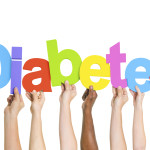 Affecting more than 29 million Americans, and with another 86 million poised to join them, diabetes is no stranger to any of us. But diabetes manifests in several different types, and it’s important to understand the differences in symptoms so that proper treatment can be obtained as quickly as possible.
Affecting more than 29 million Americans, and with another 86 million poised to join them, diabetes is no stranger to any of us. But diabetes manifests in several different types, and it’s important to understand the differences in symptoms so that proper treatment can be obtained as quickly as possible.
Gestational diabetes affects pregnant women – about 4% of them – and although a temporary condition, can be harmful to both mothers and their babies.
Usually diagnosed in children and young adults, and previously known as juvenile diabetes, type 1 diabetes occurs when the body’s immune system destroys the insulin-producing cells of the pancreas. Without these cells, sugar from the food a person eats cannot be moved out of the blood and begins to build up. When sugar builds up in the blood instead of in the body’s cells, the cells begin to starve for nutrients, causing other systems in the body to work to provide energy to keep the body functioning. According to the American Diabetes Association, only 5% of people with diabetes have this form of the disease.
Symptoms of type 1 diabetes include:
- Increased thirst
- Increased hunger
- Dry mouth
- Nausea with occasional vomiting
- Abdominal pain
- Frequent urination
- Unexplained weight loss, even though you eat and feel hungry
- Fatigue
- Blurred vision
- Frequent infections of the skin, urinary tract, or vagina
Type 2 diabetes is the most common form of the disease, affecting 90-95% of the people with diabetes. Unlike people with type 1, those with type 2 diabetes produce insulin; however, their pancreas either does not produce enough or the body cannot properly use the insulin that is made. This also causes sugar to build up in the blood as opposed to providing nutrients to the body’s cells.
Symptoms of type 2 diabetes include:
- Increased thirst
- Increased hunger
- Areas of darkened skin
- Nausea with occasional vomiting
- Numbness or tingling in the hands and feet
- Frequent urination
- Unexplained weight loss, even though you eat and feel hungry
- Fatigue
- Blurred vision
- Frequent infections of the skin, urinary tract, or vagina
If diabetes is affecting quality of life for you or a loved one, contact Best Senior Home Care. We’re helping clients throughout Queens and the surrounding areas with home care services that make life with diabetes so much easier and less stressful, and we’d love to help you as well! Call us any time at 917-880-9373 to learn more about our Queens’ area home care.
